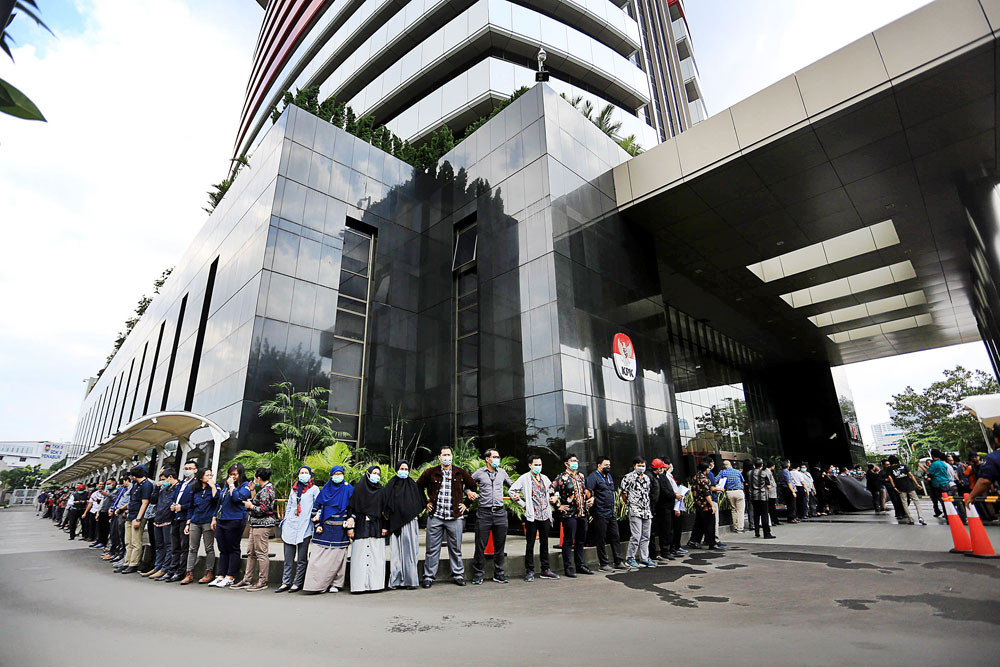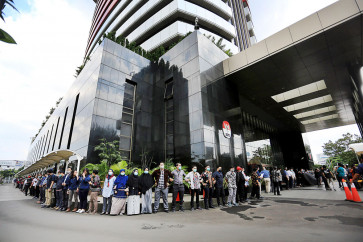Popular Reads
Top Results
Can't find what you're looking for?
View all search resultsPopular Reads
Top Results
Can't find what you're looking for?
View all search resultsDoes the antigraft body need the police?
Change text size
Gift Premium Articles
to Anyone
 Corruption Eradication Commission (KPK) employees form a human chain around their office in Jakarta on Thursday. They were sending a message that they were not afraid of intimidation in the wake of the latest assault on a KPK investigator by an unindentified man at Hotel Borobudur on May 18, 2019. (The Jakarta Post/Seto Wardhana )
Corruption Eradication Commission (KPK) employees form a human chain around their office in Jakarta on Thursday. They were sending a message that they were not afraid of intimidation in the wake of the latest assault on a KPK investigator by an unindentified man at Hotel Borobudur on May 18, 2019. (The Jakarta Post/Seto Wardhana )
D
espite claims the National Police’s deployment of their members to the country’s antigraft body is well intentioned, we need to examine whether it is really necessary.
The presence of police elements in the Corruption Eradication Commission (KPK) would not necessarily increase the effectiveness of the anticorruption agenda. Moreover, two high-ranking police officers of the nine candidates for KPK commissioner posts are suspected of intervention into a previous KPK investigation of alleged corruption within the National Police.
Although the KPK selection committee and National Police chief Gen. Tito Karnavian have said the selection process for commissioners and investigators would be run independently, this claim is problematic.
Indeed the National Police and the Attorney General’s Office have made considerable contributions to the KPK so far, but the KPK was formed precisely because conventional law enforcers failed to eradicate corruption. Encouraging their officers to be deployed to the KPK contradicts the purpose of the KPK’s founding itself.
Instead of establishing effective corrective management, the 15-year journey of Indonesia’s reputable state anticorruption agency has more often been at stake because of its struggle for credibility with the National Police. The public still remembers incidents that reflect the bitter relationship between National Police and KPK officials, broadcast in prime time. Their verbal and legal clashes are known as the three-part (so far) saga of “gecko vs crocodile”, after a high-ranking police officer challenged in 2009 what he, a powerful “crocodile”, called the “geckos” (considered weaklings) of the KPK, who were investigating his alleged corruption scandal.
The episodes of big shot police officers suspected of corruption taking on the KPK are also blamed on a lack of investigation into corruption within the police or Bhayangkara corps. Since the KPK was established, it has only handled two cases involving the police.
Transparency International’s (TI) survey of the 2017 Global Corruption Barometer shows the police are still perceived by the public to be highly prone to bribery and corruption — though less so compared to the 2015 results. Surveys last year including by Indonesia Corruption Watch also reported that illegal bureaucratic services with demands for bribes or fees were rampant within the police.

















